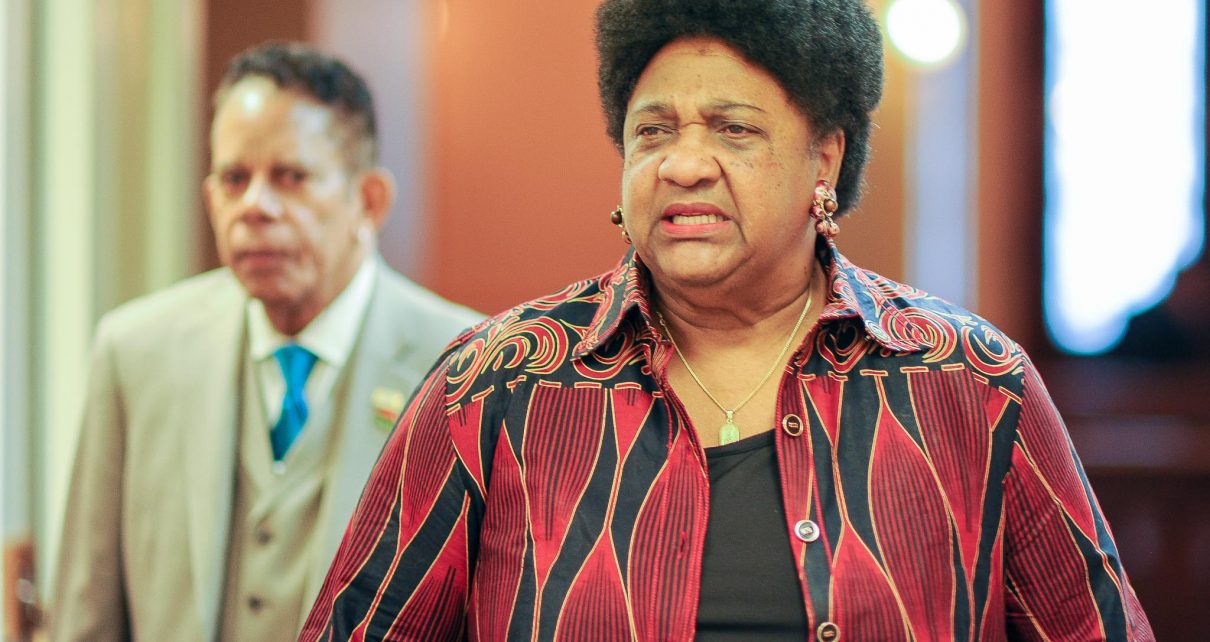
California Reparations Task Force Meets In San Diego With New Pressures Upon Them
Lawmakers want California’s system be a blueprint for nationwide reparations
By Evan Symon, January 27, 2023 7:37 pm
The California Reparations Task Force met on Friday at San Diego State University for a series of meetings lasting for two days covering both monetary and non-monetary payments. Secretary of State Shirley Weber stressed that the Force needs to create a “game changer” recommendation by the time the reparations proposal is due in July.
The Task Force was first put together in late 2020 following Gov. Gavin Newsom signing AB 3121 by Assemblywoman Shirley Weber (D-San Diego) establishing it. They are currently looking for what possible reparations, monetary or otherwise, to recommend to give to African-Americans living in California for discriminatory practices and slavery of the past, despite that California was never a slave state. While initially encompassing all people of African descent, the group of those qualified to receive reparations was significantly narrowed in March 2022 when the task force voted to limit the possible reparations only to those who are an African American descendant of an enslaved person or free Black person living in the US prior to the end of the 19th century.
In June 2022 the Task Force’s first report came out, giving a recommendation of reparations, likely in the form of home buying assistance, free college tuition, and business grants. However, one of the many criticisms against the report was that not estimated monetary figure was attached, with many worried about how high it could be. In early December, an estimate of $569 billion was provided by the state, leading to uproar and the threat of lawsuits if the number holds. Later that month, compensation compensation and eligibility requirements were discussed.
With the public now largely against such a high $569 billion total payment, the Task Force met again on Friday to see what payments may be feasible. However, with lawmakers placing an added burden on the Task Force in recent days to make California’s system be a blueprint for nationwide reparations, and looking beyond any payments for lasting meaning, the Task Force now has to make the recommendation more palatable for not only Californians, but also now make it so that most states would be okay with it.
“I genuinely believe as California goes, so goes the rest of the country,” noted Assemblyman Reginald Jones-Sawyer (D-Los Angeles) on Thursday. “And so, our reparations task force … will be the benchmark that every state that’s looking into this, every city, municipality across the country, and then the national discussion will take what we put together, our blueprint, and then try to determine as a base what the national reparations should be.”
Reparations Task Force meets in San Diego
During the meeting on Monday, Weber echoed that statement, telling the Task Force, “You have to make sure your recommendations are going to have lasting impact. You are addressing some of the most important issues in the state.” She also mentioned the significant role she thinks California plays in the reparations movement. We never seem to get across the line and make progress. So, California could do that. California is always the one that does the innovative things. We have the brainpower and knowledge to do this if we choose to.”
However, the lasting impact means that California first needs to pass the bill to get it to the next level, with the majority of Republicans and Democrats in both the Assembly and Senate gawking at the high cost, the messy definitions of who would be eligible and how it would pay out, as well as questions over if reparations are even necessary.
“The Task Force has lost a lot of momentum from when it was originally passed, and 68% of Americans oppose reparations, with majority support against them coming from all age demographics, all political demographics, and all levels of education,” legal adviser Richard Weaver told the Globe Friday. “California’s numbers are a bit skewed since California leans more than other states and has a much lower African-American percentage than other states as well, but even there the majority oppose them.”
“So that’s the hurdles right now. They are deeply unpopular, and the Task Force would need to create some sort of all-pleasing proposal to even have a chance. Even if they have it passed in both houses and Newsom signs it, they then have to contend both with groups wanting to block it and putting it to voters, which is likely, and also legal challenges, of which there are many groups and lawyers chomping at the bit to file a lawsuit against if it is ever passed in California. This is going to be a lot of money on the line, and some lawmakers are overestimating just how liberal California can be. Remember, this is the same state that has voted down affirmative action multiple times and has dismissed reparations before.”
“This is why they’re saying to try to have a bigger impact outside of the money now. They want this to go national, but they also want people to be in favor of it. And right now, it is still not popular.”
The Task Force will have until July to come up with a reparations proposal.
- Man Who Broke Into L.A. Mayor’s Home to Receive Probation, Mandatory Drug Treatment - July 25, 2024
- California National Guard Counterdrug Task Force Seizes nearly $4 Million Worth Of Fentanyl In June Following Ramping Up Of Actions - July 24, 2024
- San Francisco’s Guaranteed Income Programs for Trans People to End - July 24, 2024





Who or What organization will step up and challenge this in court?
If they do will they be shouted down with belittling slurs?
Oh! They will be called rrrrrrrrrrrrrrrrrrrrrracists!!!!!!!
Maybe if more people challenge this nonsense, the belittling slurs will eventually stop.
The task force needs to recommend that every Black high school graduate is allowed to attend any college, trade or professional school tuition free. This will ensure economic and educational equality that will last a lifetime. Anything otherwise would be a temporary vanishing material benefit fraught with problems and roadblocks as to why it can’t be done.
Pushing for educational opportunities is what President Johnson should have done with his “Great Society” program in the 60’s. Instead, he created massive welfare subsidies and built rent subsidized housing “projects” that quickly turned into crime ridden slums The net result of this mistake has been generations of people with a “why the hell should I work. I deserve free stuff” mentality.
Johnson did exactly what he intended to do, and even bragged about it. Where was Oswald’s little brother when we needed him most?
Another way to get people to leave California !!!
Perhaps we should talk about what would happen to all this “free” money should this pass (which it will not). Just look at what your typical lottery winner does. Lots of fun and a year or two later they are in debt up to their eyeballs and flat broke.
We would then be told it simply was not enough and it never can be enough for these grifters.
Just read the three “related articles” above —- as well as the comments posted there —- to get a bead on how completely nutty and unworkable and undo-able this Dem/Marxist wealth-redistribution scheme really is, even as it parades as some kind of “justice,” which is of course a mockery of real justice. And the comments will tell you how people are reacting to this nonsense.
They already got their reparations by being born here rather than in a rat hole run by an Afro-Junta tin pot dictator.
Trillions have been spent educating their children, and they still hate America for trying to make them white. Huh?
They never were a good fit for an industrialized America, and fleecing one generation to apply for another is the wrong way to do it. To my black friends: You got a free K-12 education and Obama. That is just going to have to do.
I want, I want, me me me, people are tired of this racial extortion pity party over and over. 13% of the population sure demand a LOT of attention and pity
No, only 7% in California, which includes mixed-race blacks. This from the last census count.
I understand the argument that blacks would be wealthier if they hadn’t been discriminated against in all sorts of ways and even incarcerated and killed by racist governments. But I wonder how much money the US has spent trying to limit and make up for the discrimination, starting, of course, with the Civil War. And I wonder what would happen after the reparations payments are made–do we stopping protecting blacks from discrimination? And, by the way, I want reparations for the discrimination my Italian and Scot ancestors suffered when they came here.
The reparations task force should have been shutdown from the get go! The infighting that will arise when someone who feels entitled doesn’t get a piece of the pie is surely to happen.
We need less Government not more and this is a clear example of why.
Yikes, look at the photo of Democrat Assemblywoman Shirley Weber? It looks like she transtioned to become a homely black man? Her outside appearance may changed, but she’s still racist to the core?
40 years ago women were still being discriminated against in obtaining loans. Will they get reparations?
The only group that can’t get special treatment is white men under 50? (age discrimination then) Should young white men have reparations because they don’t otherwise have a special program for them? where does this end? Government can’t even fix potholes.